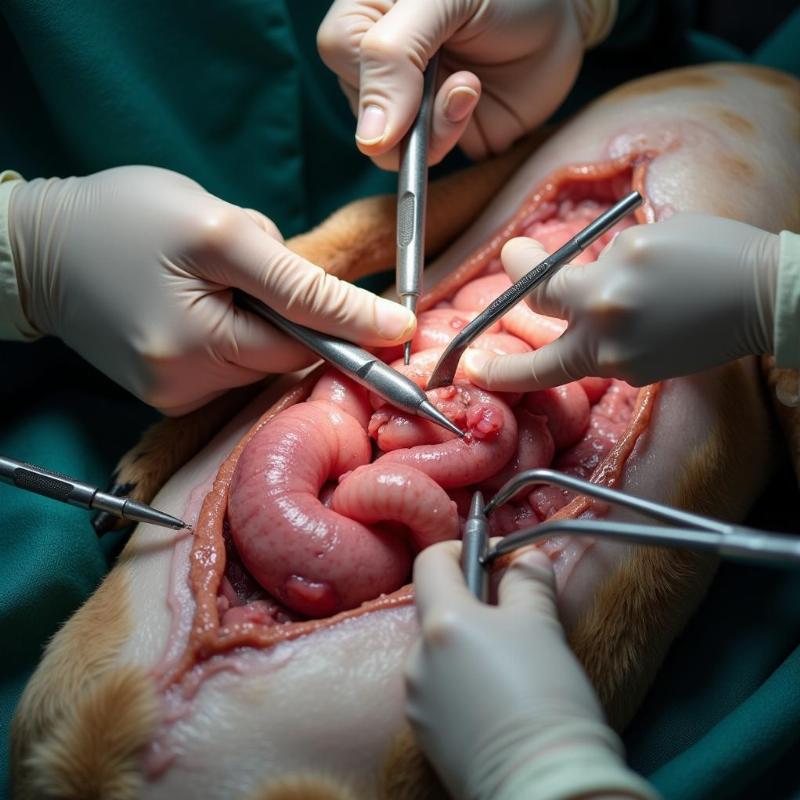Intestinal blockage in dogs, also known as gastrointestinal obstruction, is a serious and potentially life-threatening condition that requires immediate veterinary attention. This comprehensive guide will cover the causes, symptoms, diagnosis, and treatment options, including surgery on dogs for intestinal blockage, to help pet owners in the US understand this critical issue and make informed decisions.
Understanding Intestinal Blockage in Dogs
Intestinal blockage occurs when something obstructs the normal flow of food or fluid through the dog’s digestive system. This blockage can occur anywhere along the intestinal tract, from the stomach to the colon. A variety of objects can cause obstructions, including toys, bones, rocks, fabric, and even large amounts of ingested food. Early diagnosis and treatment are crucial for a positive outcome.
 Dog undergoing intestinal blockage surgery
Dog undergoing intestinal blockage surgery
Causes of Intestinal Blockage
Dogs, especially puppies, are notorious for exploring the world with their mouths. This curiosity often leads them to ingest foreign objects, which can become lodged in their intestines. Common culprits include:
- Toys: Small balls, stuffed animals, and squeaky toys can easily be swallowed and cause blockages.
- Bones: Cooked bones, particularly chicken and pork bones, are brittle and can splinter, causing serious damage to the intestinal lining. Raw rib bones for dogs can also pose a risk, especially if swallowed whole.
- Rocks and Sticks: Dogs often pick up these items outdoors and can accidentally ingest them.
- Fabric: Socks, towels, and other cloth items can obstruct the digestive tract.
- Food: Large pieces of rawhide, excessive amounts of food, or certain types of food can cause blockages. Are tamales bad for dogs? Yes, due to their corn husk wrapping which can cause blockages. Are pork chop bones bad for dogs? Absolutely, as they can splinter and cause internal damage.
Symptoms of Intestinal Blockage
Recognizing the signs of intestinal blockage is crucial for prompt treatment. Symptoms can vary depending on the location and severity of the blockage, but common signs include:
- Vomiting
- Diarrhea (sometimes bloody)
- Loss of appetite
- Lethargy
- Abdominal pain and distension
- Straining to defecate with little or no stool produced
- Dehydration
- Whining or crying
If your dog exhibits any of these symptoms, contact your veterinarian immediately.
Diagnosing Intestinal Blockage
Veterinarians use a combination of methods to diagnose intestinal blockage. These include:
- Physical examination: Palpating the abdomen can sometimes reveal a distended or painful area.
- Blood tests: These tests can help assess the dog’s overall health and detect dehydration or infection.
- X-rays: Abdominal X-rays can often reveal the presence of a foreign object or blockage.
- Ultrasound: This imaging technique provides a more detailed view of the intestines and can help pinpoint the location and nature of the blockage.
Treatment: Surgery on Dogs for Intestinal Blockage
Surgery is often the necessary treatment for intestinal blockage in dogs. The specific surgical procedure will depend on the location and type of blockage. In some cases, the veterinarian may be able to remove the object endoscopically, a less invasive procedure. However, if the object is large, sharp, or has caused significant damage to the intestines, open surgery is required.
During surgery, the veterinarian will make an incision in the abdomen to access the intestines. The blockage is then carefully removed. If a portion of the intestine is damaged or necrotic, it may need to be surgically removed.
Post-Operative Care
After surgery, your dog will require careful monitoring and pain management. Your veterinarian will provide specific instructions regarding feeding, medication, and wound care. It’s essential to restrict your dog’s activity to prevent complications, such as incisional infections or dehiscence (opening of the surgical wound). Regular check-ups with your veterinarian will be necessary to ensure proper healing.
Conclusion
Intestinal blockage is a serious condition that requires prompt veterinary attention. Recognizing the symptoms and seeking immediate care can significantly improve your dog’s chances of a full recovery. While surgery is often necessary, advances in veterinary medicine offer less invasive options in some cases. With proper care and monitoring, dogs can recover well from surgery on dogs for intestinal blockage and live long, healthy lives. Can dogs eat cooked crawfish shells? No, they pose a choking and blockage hazard. Is styrofoam poisonous to dogs? Yes, and can also cause blockage.
FAQ
- What is the most common cause of intestinal blockage in dogs? Ingesting foreign objects, such as toys, bones, and rocks.
- Can intestinal blockage be fatal? Yes, if left untreated, intestinal blockage can be life-threatening.
- How much does surgery for intestinal blockage cost? The cost varies depending on the complexity of the case, but it can range from several hundred to several thousand dollars.
- What are the signs my dog has an intestinal blockage? Vomiting, diarrhea, loss of appetite, lethargy, abdominal pain, and straining to defecate.
- How can I prevent my dog from getting an intestinal blockage? Supervise your dog, especially puppies, and keep small, potentially hazardous objects out of their reach.
- What is the recovery time after surgery for intestinal blockage? Recovery typically takes several weeks, and your dog will need to be closely monitored during this time.
- What are the long-term effects of intestinal blockage surgery? Most dogs recover fully, but some may experience occasional digestive issues.
Beautdogs.us is your premier source for comprehensive and trustworthy information on dog care, breeds, and lifestyle in the US. We offer expert advice for both novice and experienced dog owners, covering everything from health and nutrition to training and behavior. Beautdogs.us is committed to empowering dog owners with the knowledge they need to provide the best possible care for their furry companions. For inquiries or to learn more about our services, please contact us at [email protected] or call us at +1 501-555-7529. Visit Beautdogs.us today!